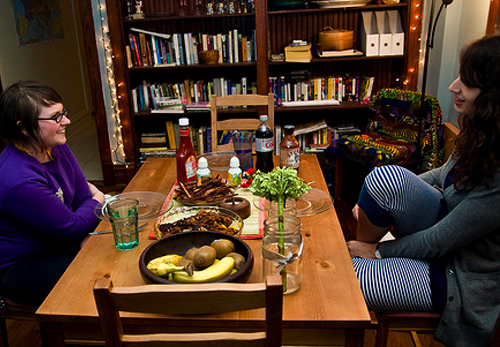Traveling Mercies: Hospitality for the Traveler
This post may contain affiliate links, including those from Amazon.com, which means we earn a small commission off your purchases. And here's the thing: We only mention services and products that we think are truly worth your attention, whether they're free, paid, or otherwise. This site relies on YOUR trust, so if we don't stand behind a product 110%, it's not mentioned. Period.



One of things I remember most from my growing up years is the road trips we took every summer. Most of the time we did them long-haul style, meaning we got in the car and 16 hours later got out at our destination, stopping only for gas. We had a cooler full of food in the back that provided our meals and we did all our stretching and bathroom breaks at the gas station. It was grueling but invigorating all at once, and since we'd done it that way since I was about three years old, I never questioned it.
However, there were the times when we did longer trips when the long-haul style just wasn't viable. There were also trips when we wanted to stop and see things along the way. In those cases, we didn't book a hotel, but made use of the old tradition of Hospitality – we stayed in the homes of strangers who made their homes available in order to provide respite and warm hospitality to weary travelers.
Now, this may sound strange – I mean, who in their right mind would open their homes to strangers? – but there is a long tradition through history of taking care of travelers, stranger or not. Through centuries of European history, hospitality was considered a fundamental moral practice. By bringing travelers into your home, you could offer them provision, protection, and connection with a larger community. ((O'Gorman, The Origins of Hospitality and Tourism, Goodfellow Publishing, 2010.)) In ancient Ireland, it was actually law to welcome travelers into your home and provide them with whatever they needed, and it was considered good for the land and the people because it encouraged travel and trade. ((Ancient Sites, The Tradition of Hospitality))
In this day and age, this practice has largely been lost, but both offering and receiving hospitality are well worth the effort. Not only is finding homestays an incredibly frugal way to travel, it's a way to build friendships and get to know the “local” scene better than you could any other way. This is especially true if you're traveling internationally.
Hosting families from other parts of the world – both near and far – is also an excellent way to nourish your own family. In hosting, children learn compassion and get to practice being good hosts. They gets to hear stories of adventure and are exposed to cultures and perspectives different than their own. It also helps them deepen their sensitivities of how to be attentive to the needs of others.
The Bishop's Candlesticks
One of my favorite stories in classical literature about hospitality is from Victor Hugo's Les Miserables. When Jean Valjean is still a criminal and has escaped from prison, he stops at the home of a bishop to seek a bed for the night. The bishop welcomes him in, shows him to his room, and retires for the night. He is awakened during the night by a knock at the door. When he opens it, there is a soldier, holding Jean Valjean, who has been arrested for stealing the bishop's pure silver silverware. The bishop turns and looks at the mantel where the silverware had been kept, then turns to Valjean and says, “But you forgot the candlesticks.” Valjean is so humbled by the lack of condemnation he is shown by the bishop that he returns all the silver, renounces his life of crime, eventually becomes Mayor, and becomes an instrumental leader of all the events that unfold through the story.
Specifically in my case, I learned about hospitality from the Mennonites and the Mennonite Your Way hospitality directory (as well as my own parents' example, of course). Mennonites in particular have a long-standing tradition of practicing hospitality, so starting a directory of homes to offer hospitality to travelers was not a stretch for the two Mennonite couples who founded Mennonite Your Way more than 30 years ago. And while the MYW directory is the way we always found places to stay in my growing up years, it's certainly far from the only hospitality directory out there.
A Listing of Hospitality Networks
One of the keys to “successful” home sharing is being connected to people who have similar interests or other things in common. Thus, many of these networks are specific to certain demographics: a certain age bracket, a certain religious belief, etc. All of these organizations have members in the United States and Canada, as well as internationally. Also, organizations differ greatly in the role of the host: some specifically offer a bed and perhaps breakfast and you are expected to be self-sufficient, while others specifically seek to get people together to share time and experiences.
Mennonite Your Way: MYW was founded in 1977 andrenews an old tradition among Mennonites, Brethren, and other Christians of “like spirit” by organizing a hospitality network so travelers can share Christian courtesy and fellowship. No fee, although guests are requested to leave a small recommended donation for their hosts.
Egeria Exchange: A home exchange for Orthodox Christians or anyone interested in Orthodoxy. Their site includes several helpful travel planning tools, including unique items such as tips on how to be a guest at a monastery or when visiting a new parish. Membership is through low annual dues.
World Wide Opportunities on Organic Farms (WWOOF) – In return for volunteer help, WWOOF hosts offer food, accommodation and opportunities to learn about organic lifestyles. Opportunities exist worldwide. There is a small fee to help offset administrative costs.
Hospitality Club – A hospitality “matchmaking” club featuring members in more than 200 countries. Members can view profiles, send messages, and leave feedback for other members on the Hospitality Club website. Membership is free.
CouchSurfing.org – CouchSurfing is an international non-profit network that connects travelers with locals in over 230 countries and territories around the world. Membership is free, but to be “verified” (an additional security identity check) you are requested to make a donation.
Warm Showers – a hospitality site specifically for those on cross-country/international bicycling trips. Membership is free.
Tripping – Tripping.com is a global network of travelers who believe cultural exchange makes the world a better place. The owners of the site aim to make Tripping the “safest hospitality network on the planet” due to their latest travel tools and technology and a 24-hr SOS hotline in case of emergency. Membership is free.
Evergreen Club – Bed & Breakfast homestays for people over 50. Annual dues are $75 plus a $10-15 gratuity given to each host.
If you'd like to find more organizations that offer free or frugal travel, WikiTravel and CopperWiki are good places to start.
How to Be a Good Guest
1. Be considerate and mindful of your hosts. Your hosts certainly want to welcome you, but the rhythm of their lives shouldn't have to change drastically because of your visit. End your chatting at a decent hour and ask what their morning schedule is like so that there are no conflicts with shower times or use of other shared spaces. If you're staying for several days, be sure to have outings planned during the day, or if you need to be at home (say, at a child's naptime), have quiet activities planned that can be confined to guest spaces. And as always, be sure to ask before using anything that belongs to your host.
2. Stay in touch from the road. Often it's understood that when you're crossing long distances, arrival times are approximate. However, if you're several hours past your estimated arrival time or if it's late in the evening, be sure to call your host to let them know. That way they can make appropriate plans for their own schedule.
3. Be modest. When you're sharing space in other people's homes, it's always a good idea to err on the side of modesty for all family members, including young children. Be sure to pack appropriate pajamas and change either in your bedroom or in the bathroom.
4. Make special needs known ahead of time, if at all possible. If you have young children who tend to wake up at night, bring this up ahead of time to discern whether the host is a good fit for you – also, if you need to prepare bottles or other baby food, especially in the middle of the night, ask in advance if you will be able to use the stove/sink/microwave, etc. If you are on a tight schedule and will need to rise early the next morning, let your host know that you would prefer to skip chatting on this visit so that you can go to bed early. For dietary requirements, such as a severe allergy to nuts, the easiest way is to bring food you know is safe.
How to Be a Good Host
1. Be welcoming. When guests arrive, greet them warmly, show them where they will be sleeping, and offer to help them with their bags if you are able. Have their beds ready and guests towels set aside. Offer them a refreshing beverage – water, tea, or coffee, and chat long enough to get to know your guests a bit and make them feel welcome. Beyond that, however, it is up to you to set the tone of the visit. If you like to sit and visit, invite the guests to join you in a comfortable place to continue the conversation. However, if you prefer to retire early and you would like your guests to make themselves at home without you, give them a quick tour of the rooms they are welcome to use, then feel free to go about what you need to do for the evening.
2. Your home need not be immaculate, but it should be tidy and comfortable. Making your home look like a showhome is unnecessary, and in fact, doesn't help people feel at home – it should look like a home that is lived in and used well. However, it shouldn't be dirty or excessively cluttered. The aim of hospitality is to provide a place where people can relax comfortably and feel welcomed and peaceful.
3. Express expectations clearly. If guests may use the telephone or the television, let them know and show them how it works. If you have an early meeting and need to use the shower before 7:00, make sure that's known. Early communication will eliminate (or at least minimize) stressful situations.
Other Things to Keep in Mind
There are rarely safety issues with home exchanges, but EgeriaExchange.org has some good answers to this question. Most of the time when you host people from a network, your guests are also members of that network, which means that at other times, they are the hosts and often don't come to take advantage of you. However, it's always wise to think ahead and set away anything you don't want used, discussed, or misplaced.
Further Reading
You can download a review of these three books here. To read the review online, click here.
Pohl, Christine. Making Room: Recovering Hospitality as a Christian Tradition. Grand Rapids, MI: Eerdmans, 1999.
Oden, Amy. G., ed. And You Welcomed Me: A Sourcebook on Hospitality in Early Christianity. Abingdon Press, 2001.
Newman, Elizabeth. Untamed Hospitality: Welcoming God and Other Strangers. Brazos Press, 2007.






2 Comments